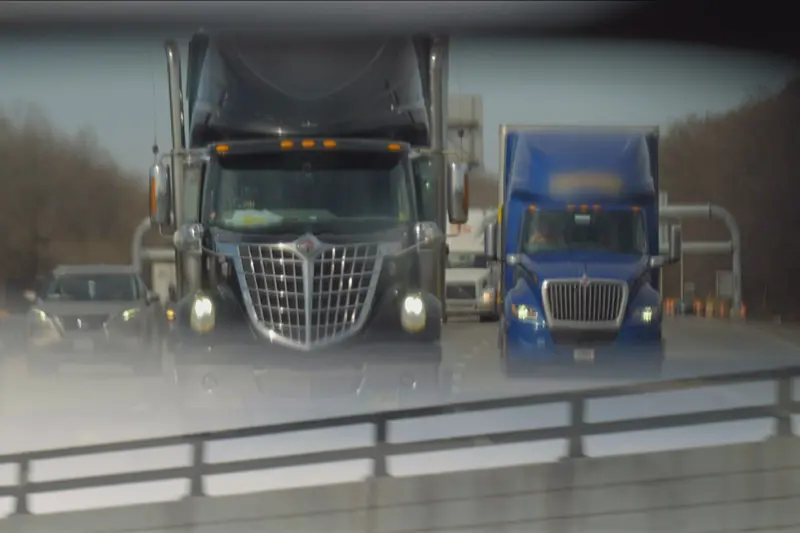How Recent State Laws Are Making It Harder to Sue Trucking Companies After Crashes
Texas, Florida, Iowa and other states have passed new laws backed by trucking industry lobbyists that can limit crash victims’ ability to bring lawsuits or cap the compensation plaintiffs can win.


Series: America’s Dangerous Trucks
Inside the Battle to Prevent Deadly Crashes
The trucking industry is engaged in a concerted lobbying effort that critics say will make it harder for victims of crashes to sue the companies involved and limit the compensation plaintiffs can win. In the past three years alone, the industry has helped prompt new laws in seven states including Texas and Florida, which rank among the highest in the nation for fatal truck crashes.
The industry says those new laws will help curb frivolous lawsuits and excessive payouts, but safety advocates say they instead shield trucking companies from legitimate liability after crashes and disincentivize the companies from working to prevent crashes in the first place.
The new laws come as fatal truck crashes are on the rise. More than 5,000 people die each year in crashes with large trucks, up by more than 50% compared with a decade ago. FRONTLINE and ProPublica’s recent documentary, “America’s Dangerous Trucks,” examined one gruesome kind of truck accident — underride crashes — and why they keep happening.
After a crash, the best way a survivor can receive compensation for serious injuries or the loss of a loved one is to sue the trucking company and driver, according to Joe Fried, an attorney in Georgia with two decades of experience in truck crash litigation who spoke to FRONTLINE. That’s because most truckers carrying general freight across state lines are required by law to have $750,000 in liability insurance, but lifetime medical costs after serious crashes can quickly exhaust that amount. Carriers may be ordered to pay more than that figure, but if the company goes bankrupt or does not have the assets to pay, victims may never receive it. The $750,000 minimum was set by Congress in 1980 and, despite numerous efforts to increase it, has remained unchanged.
In late 2019, one of the trucking industry’s most vocal leaders, Chris Spear of American Trucking Associations, described crash lawsuits as an “all-out assault” on the industry in a radio interview. In a speech to ATA members around that time, Spear announced curbing crash lawsuits as a “tier-one priority” for the organization and vowed to work with state governments and state lobbying groups to pass new laws to do so. Since then, the ATA has also said that crash lawsuits are becoming more frequent and expensive, therefore raising insurance costs for carriers.
Mark Geistfeld, a professor of civil litigation at NYU Law and the author of five books on liability, told FRONTLINE he’s heard similar refrains about frivolous lawsuits from industry groups since the 1980s. That’s when industry lobbyists began trying to pass what they called tort reforms at the state level. Geistfeld has examined tort reform since then, noting that while the movement is less active now than it was in the 1980s, industries like trucking are ramping up their efforts.
“They call it reform, but historically most of the reforms have been about cutting back on liability,” Geistfeld said, referring to the industry groups.
He called the issue of meritless lawsuits a “bogeyman,” as the legal system has ways of sanctioning plaintiff lawyers if they knowingly bring frivolous cases. Industries campaigning for tort reform, he said, are typically more focused on reducing the amount they’ll be liable to pay if found responsible. They do so through campaigns for new state laws that change things like how trials are conducted, set caps on damages or redefine what evidence can be produced at trial.
Iowa, Montana, West Virginia, Louisiana and Missouri have also passed new tort reform laws supported by the trucking lobby. They take different forms in each state: Louisiana and West Virginia repealed rules which had prevented defense lawyers from bringing in evidence about whether the plaintiff had been wearing a seatbelt, and a law in Missouri raised the bar for ordering a trucking company to pay punitive damages. Jeremy Kirkpatrick, spokesperson for the ATA, said the state laws mark “initial successes in a long term campaign.”
While negligent trucking companies should be held accountable, he said, the new tort reform efforts the ATA is supporting aim to restore “balance and fairness” to the litigation system and are not about reducing liability. When a trucking company’s insurance premiums go up after large verdicts and settlements, according to Kirkpatrick, leadership may cut costs by lowering wages, which can mean hiring less experienced drivers and can have a negative impact on safety.
“The trucking industry has become a target for plaintiff-attorney profiteering,” he said. “This is about reforming specific rules and practices that enable plaintiffs’ attorneys to inflate damages and engineer nuclear and disproportionate verdicts and settlements.”
Texas: Limits on Company Liability and EvidenceTexas, which ranked first in the nation for truck-related fatalities in 2020 with 643 deaths, passed a law in 2021 that says trucking companies cannot be sued for their role in a crash unless the driver has first been found liable by a court — a process called a bifurcated trial. It passed with support from the Texas Trucking Association, a state lobbying group and ATA member, which said the law will protect trucking companies from “biased and unfair courtroom tactics.”
Previously, according to trucking lawyer Fried, plaintiff attorneys could bring in evidence about a trucking company’s broader practices — such as how many other accidents it was involved in — to convey to the jury that the crashes were a systemic problem. It’s a practice long-derided by truck lobbying groups, which refer to it as “reptile theory” and say it wrongfully aims to rile up the jury against trucking companies to encourage larger verdicts.
The new Texas law changed that. In the first phase of the trial that determines compensatory damages, attorneys are now more confined to the facts immediately surrounding the specific accident and whether the company was negligent in hiring or vehicle maintenance before the crash. Broader evidence about the company’s past is only allowed if the driver or company is proven at fault and the trial moves to a second phase. It’s a legal change Fried expects trucking groups will try to bring to other states.
“This passed in Texas because the politics were ripe for it there,” he said. “But it’s definitely being pursued elsewhere.”
Florida: Shrinking the Window to SueThe trucking lobby also notched a win in Florida, which ranks third in the nation for truck-related fatalities, with a law passed in March that made a number of changes to civil litigation that are particularly relevant to trucking. Alix Miller — president and CEO of Florida Trucking Association, an ATA member — lobbied heavily for its passage.
“Florida is one of the worst when it comes to trucking litigation,” Miller told FRONTLINE, saying that the state’s new law and others like it aim to make the legal system more balanced for defendants. The Florida law changes how medical bills are presented at trial by only admitting the amount paid versus the amount initially billed. It also reduces the statute of limitations from four to two years for personal injury cases.
Safety advocates say that a shorter time frame in which one can sue becomes an obstacle to victims in their effort to pursue accountability after crashes.
“When you talk to victims who have been through this, they will tell you that the first two to three years are completely disorienting,” said Zach Cahalan, executive director of Truck Safety Coalition, a group that provides resources and support to people involved in truck crashes and advocates nationally for safety regulations. He noted that victims often have to deal with a deluge of paperwork, medical bills, physical therapy appointments and other demands as they process the crash.
“By the time they realize that ‘Hey, I might need to pursue a civil trial,’” he said, “sometimes the statute of limitations is over.”
Iowa: Caps on DamagesAnother path these laws have taken is to cap the amount of noneconomic damages awarded to plaintiffs — compensation for losses that, unlike medical bills or wages, cannot be easily measured, such as the loss of a child.
The Iowa legislature passed a law in April, supported by the Iowa Motor Truck Association, an ATA member, that caps pain and suffering payments to $5 million in accidents involving commercial vehicles, though it includes exceptions for certain situations of extreme negligence, like if the driver was intoxicated.
Supporters of the law say that plaintiff lawyers profit too much off of crash litigation and that the cap will help fix this. But Cahalan of the Truck Safety Coalition opposes such limits on damages, and he said instead that juries should continue to have agency in determining how much should be paid after a crash.
“Your ability to be made whole following a crash should not be arbitrary,” he said.
Geistfeld, from NYU Law, said that whether in trucking or another industry, the outcomes of tort reform efforts decide who is responsible for paying for the cost of injuries. They also shape the incentives that businesses weigh when deciding how to conduct their operations safely, he said.
“The idea, ultimately, is if the businesses are forced to pay for the liabilities of their drivers, then the businesses are going to adopt safety measures to try to make sure that they can do as much as possible to keep drivers from getting into crashes,” he said. “And that’s obviously good for society.”
ProPublica is a nonprofit newsroom that investigates abuses of power. Sign up to receive our biggest stories as soon as they’re published.
“America’s Dangerous Trucks” is part of a collaborative investigation from FRONTLINE and ProPublica. The documentary premiered on June 13, 2023, and is available to stream in the PBS App and on FRONTLINE’s website.
ProPublica is a nonprofit newsroom that investigates abuses of power. Sign up to receive our biggest stories as soon as they’re published.
“America’s Dangerous Trucks” is part of a collaborative investigation from FRONTLINE and ProPublica. The documentary premiered on June 13, 2023, and is available to stream in the PBS App and on FRONTLINE’s website.






